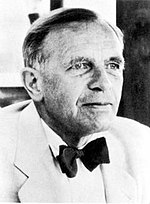About Wilhelm Röpke
- Wilhelm Röpke (October 10, 1899 – February 12, 1966) was Professor of Economics, first in Jena, then in Graz, Marburg, Istanbul, and finally Geneva, Switzerland, and one of the spiritual fathers of the social market economy, theorising and collaborating to organise the post-World War II economic re-awakening of the war-wrecked German economy, deploying a program sometimes referred to as the sociological neoliberalism (compared to ordoliberalism, a more sociologically inclined variant of German liberalism).With Alfred Müller-Armack and Alexander Rüstow (sociological neoliberalism) and Walter Eucken and Franz Böhm (ordoliberalism) he elucidated the ideas, which then were introduced formally by Germany's post-World War II Minister for Economics Ludwig Erhard, operating under Konrad Adenauer's Chancellorship.
- Röpke and his colleagues' economic influence therefore is considered largely responsible for enabling Germany's post-World War II "economic miracle".
- Röpke was also a historian and was nominated to the Nobel Prize in Literature in 1965.
Read more at Wikipedia
See Also
- Famous People's Birthdays on 10 October, Germany
- Famous People's Birthdays in October, Germany
- Famous economist's Birthdays on 10 October, Germany
- Famous economist's Birthdays in October, Germany
- Famous university teacher's Birthdays on 10 October, Germany
- Famous university teacher's Birthdays in October, Germany


 Date of Birth:
Date of Birth:  Place of Birth: Schwarmstedt, Lower Saxony, Germany
Place of Birth: Schwarmstedt, Lower Saxony, Germany